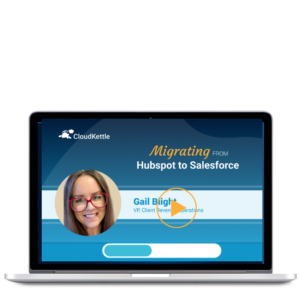
Video
When is it time to Migrate from HubSpot to Salesforce?
In this video, VP of Client Revenue Operations – Gail Blight – reviews the signs that an organization may be ready to switch from HubSpot to Salesforce.
Read more from Gail on when it might be time to move to Salesforce.
Transcript:
Hi! I’m Gail Blight, VP of Client Revenue Operations at CloudKettle.
When is the right time to move from HubSpot to Salesforce? Or perhaps more importantly – when does it become necessary?
While HubSpot will meet the needs of some mid-sized organizations, most fast-growing companies with a B2B enterprise sales motion will outgrow it.
And while HubSpot can be an amazing solution for companies with straightforward RevOps requirements, it is limited in its ability to deliver on more complex yet critical areas, and this limited ability can slow long-term revenue and operational growth.
Here are 5 key indicators that will tell you it’s time to move to Salesforce:
#1. Reporting Capabilities of your Solution
The reporting capabilities with HubSpot are bare bones compared to Salesforce’s native reporting functionality. Not only is the reporting in all editions more robust, but you also have the ability to add native AI solutions and Business Intelligence platforms like CRM Analytics and Tableau. This allows for even more sophisticated full funnel and pipeline analysis and powerful, near-real-time dashboards for essential items including executive pipeline reviews.
#2. Customization
If you’re at a point where you need to customize your instance further, the adaptations available for your HubSpot CRM are primarily limited to basic automation, page layouts and reporting. In Salesforce, you can customize using a declarative interface (clicks) AND development (code), depending on the requirements. When your needs become more complex, Salesforce can easily be adapted and become more extensible to other tools, like your internal systems.
Generally speaking, you can adapt your Sales process to fit what HubSpot can accommodate, … BUT… you can adapt Salesforce to fit your Sales process.
#3. Pricing Model
HubSpot does not allow for the same complexity in a pricing model as Salesforce. If your organization has a need to use complex price books and calculate product and revenue schedules for improved data accuracy and reporting, this will not be supported natively through HubSpot. When you get into upsell/cross-sell, proration, and other similar complexities, these can be managed directly in Salesforce and further extended with a tool like CPQ.
#4. Forecasting and Pipeline Inspection
Salesforce’s Forecasting and Pipeline Inspection tools are invaluable, but are not functionalities available through HubSpot. These tools allow SDRs, BDRs, AEs and Leadership to see a consolidated view of pipeline metrics, opportunities, and weekly changes so that teams are armed with the critical information and know which opportunities should be the focus of their time and energy. The adaptability and robustness of Salesforce’s native reporting makes building a sophisticated dashboard a cinch – whether that’s for Executive review, or 1:1 weekly coaching meetings between Sales team members and managers.
#5. There’s an App for That
Salesforce has over 20,000 integrations available on the AppExchange, whereas HubSpot’s ecosystem is about 10% of that. Instead of being able to choose the best solution you need, businesses often have to opt for the one or two options that integrate with HubSpot or rely on a non-native option like Zapier, which is not ideal.
In essence, using a small and medium-sized business CRM like HubSpot may work for your organization today, but as it grows, your organization will reach a point where the system can no longer achieve what’s required of the business. This in turn can lead to deceleration in revenue growth, decrease in customer satisfaction and retention, and impairment of operational efficiencies.
As you consider when is the best time to migrate from HubSpot to Salesforce for your business, get in touch with us! We’ll walk you through key considerations for a project like this and answer any questions you may have.
Video
Agentic Marketing Showdown: Bringing AI to the Inbox
When you have Salesforce MVP Eliot Harper combine cutting-edge AI and a common ecommerce experience, […]
Watch the videoVideo
Data Science Video Series
So you want to learn about Data Science? Lucky for you, we’ve got an in-house […]
Watch the VideosSign up for the latest tips & news from CloudKettle